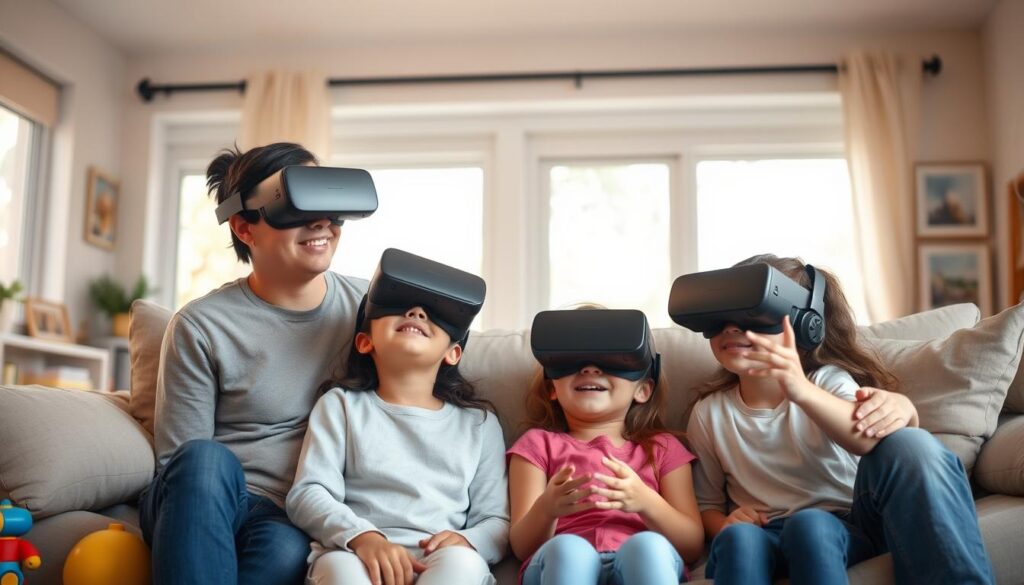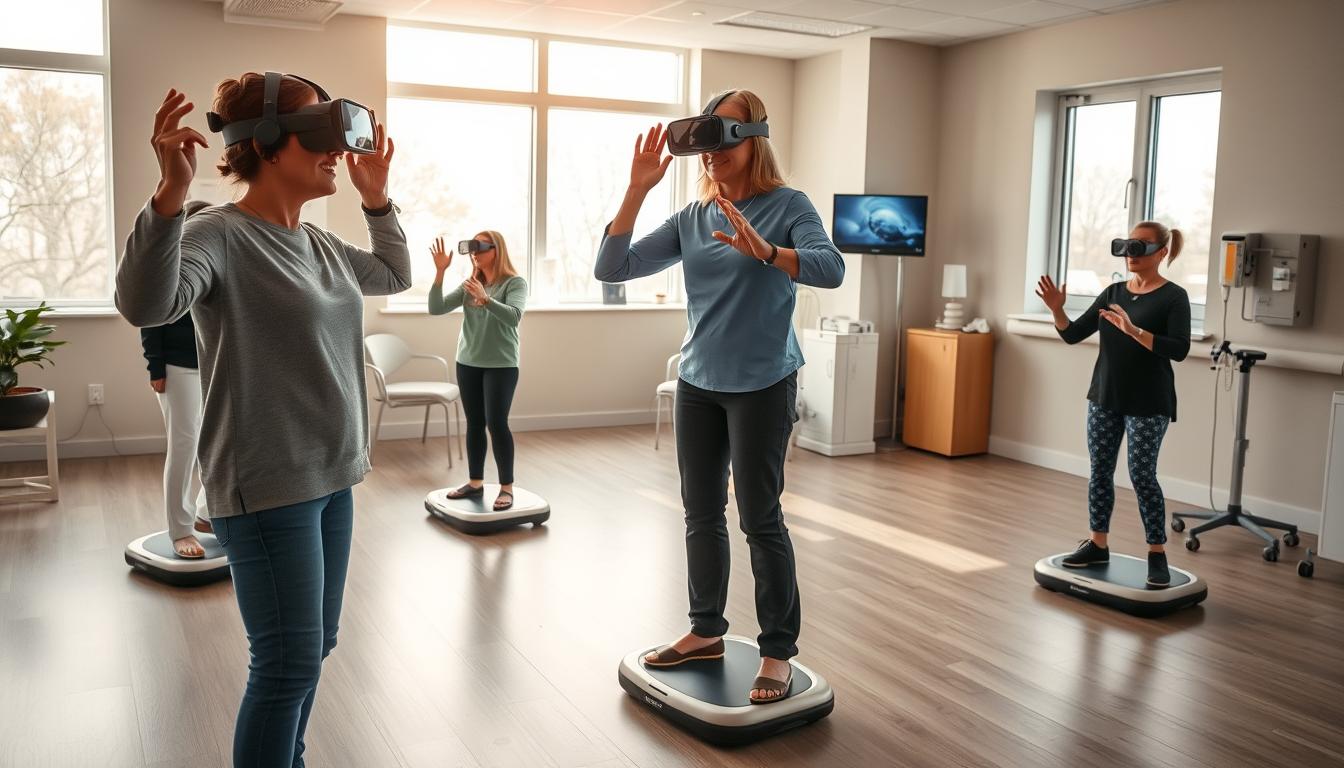Anúncios
Have you ever thought about how virtual reality can change teaching emotional intelligence? VR role-playing games are becoming more popular in schools. They offer a new way to learn about social-emotional skills.
This article looks at how VR and emotional intelligence come together. It shows how these games can help us develop important life skills. As more people want to learn about emotional intelligence, VR games are playing a big role.
Anúncios
Introduction to Emotional Intelligence and VR
Emotional intelligence is key for good communication and managing relationships. It helps us understand and control our feelings and connect with others. Virtual reality (VR) is becoming a great tool for learning these skills.
With VR, students can dive into real-life social scenes safely. This lets them practice emotional intelligence in a practical way. It helps them grow in self-awareness, social skills, and empathy.
This mix of emotional intelligence training and VR boosts learning. It also gets people ready to handle complex emotional situations in life.
Anúncios
The Intersection of VR Gaming and Emotional Intelligence
VR gaming and emotional intelligence merge to create immersive experiences that grab your attention. This tech lets people dive into emotional scenarios, boosting empathy and self-awareness. Players face challenges that help them understand their feelings and others’ too.
This new way of learning makes lessons more real and meaningful. In VR, players go through emotional situations, learning from their reactions. This helps them develop emotional intelligence, useful in everyday life.
The power of immersive experiences is huge, from schools to workplaces. In today’s world, where good communication and emotional strength matter, VR gaming and emotional intelligence are key. They prepare us for the future’s challenges.
Understanding Emotional Intelligence
Emotional intelligence is key in both personal and work relationships. It includes several important parts. This skill helps us grow and improve how we connect with others.
Components of Emotional Intelligence
Emotional intelligence has four main parts. First, self-awareness lets us know our feelings and how they affect us. Then, social awareness helps us understand others’ emotions.
Self-management lets us control our emotions. Lastly, relationship management helps us build strong bonds with others.
Importance of Emotional Intelligence in Life Skills
Learning emotional intelligence is crucial for life skills. People with high emotional intelligence handle conflicts well and communicate better. They also work well with others because they understand and care about their feelings.
Research shows they do well in school and work. They make better choices, lead well, and feel happier overall.
Benefits of VR for Teaching Emotional Intelligence
Virtual reality is a powerful tool for teaching emotional intelligence. It creates immersive learning environments where users can explore complex emotional scenarios. This technology grabs attention and helps learners develop essential emotional skills in real-life situations.
Immersive Learning Environments
VR stands out for its ability to take learners into realistic settings. These environments simulate situations that require emotional responses. Learners interact with digital avatars and practice emotional regulation and conflict resolution.
This method makes emotional intelligence training practical and relatable. It helps learners understand and apply emotional skills in everyday life.
Enhanced Empathy Through Perspective-Taking
VR also boosts empathy by allowing users to see things from another’s perspective. They can feel and understand the challenges faced by others. This unique feature of VR enhances emotional connections and deepens understanding of different emotional responses.
Such experiences help learners develop empathy and broaden their social awareness. They learn to see the world from different viewpoints, fostering emotional intelligence.
VR Games Emotional Intelligence
VR games for emotional development are getting more popular. They help teach important emotional skills. Players can dive into role-playing games that make them think about themselves and others.
This mix of gaming and learning about emotions opens up new ways to grow personally.
Top VR Role-Playing Games for Emotional Development
There are many VR role-playing games that improve emotional knowledge and skills. Some top ones include:
- Breaking Boundaries in Science – This game shows the lives of women who changed science. It lets players feel their struggles and victories.
- Job Simulator – It lets players see what different jobs are like. They learn to solve problems and understand social situations.
- Fallout 4 VR – Players make big choices in a world after a disaster. It teaches about morality and caring for others.
How VR Simulations Provide Unique Learning Experiences
VR simulations offer learning experiences that regular classes can’t match. They put students in real-life situations. This helps them learn emotional skills like:
- Handling conflicts – Players learn to solve disagreements. They get better at negotiating and seeing things from others’ viewpoints.
- Listening well – Interacting with characters in VR improves listening and responding to emotions.
- Making decisions – Players face situations where they must make quick, thoughtful choices. These choices involve empathy and understanding emotions.
Key Features of Effective VR Games for Emotional Growth
Effective VR games for emotional growth have key elements. They simulate real-life scenarios for safe practice. Gamification makes learning fun by turning tasks into challenges. This boosts social-emotional learning.
Realistic Scenarios for Skill Application
Realistic scenarios are vital in VR games. They let players practice emotional skills in real-like settings. This helps in solving problems and managing emotions in different situations.
Gamification of Social-Emotional Learning
Gamification makes learning fun and effective. It uses points, levels, and rewards to keep users engaged. This approach fosters teamwork and cooperation, key for social-emotional learning. It helps users grow emotionally while having fun.

Case Studies of Successful VR Games in Education
Looking at case studies shows how VR games improve learning, especially in emotional intelligence. These games make learning fun by letting players explore complex situations. This helps them grow emotionally and develop important skills.
Breaking Boundaries in Science
This VR game takes students back in time to key historical events. They get to see things from the perspective of famous scientists. This way, they learn not just facts but also the feelings of those times.
By making choices and solving problems, they learn to understand others better. This shows how emotional intelligence works.
Other Notable VR Educational Games
Many VR games are out there, all helping with social-emotional learning. They use stories and teamwork to teach important life skills. Players learn to work together, understand others, and think about their own feelings.
This helps them become better at getting along with others.
Here’s a table with some key VR games and what they teach:
| Game Title | Primary Focus | Emotional Skills Developed |
|---|---|---|
| Breaking Boundaries in Science | Historical Events | Empathy, Self-Awareness |
| Emotions in Motion | Social Interactions | Collaboration, Conflict Resolution |
| Journey to Empathy | Perspective-Taking | Understanding Others, Emotional Regulation |
How VR Enhances Social-Emotional Learning (SEL)
Virtual Reality (VR) is a great tool for improving SEL. It lets students dive into real-life social scenes in a safe way. This helps them learn and grow in emotional intelligence and resilience.
Engaging Students in Social Situations
VR lets students enter different social scenes that test their emotional and social skills. These experiences are safe for them to try out different ways of interacting. It helps them learn to communicate and understand others better.
Fostering Collaboration and Teamwork Skills
VR helps students work together to solve problems in virtual worlds. This teamwork builds leadership and trust among them. It’s a key way to improve teamwork skills that help students in many areas of life.
Challenges of Implementing VR in SEL
Using virtual reality (VR) in social-emotional learning (SEL) comes with challenges. The tech offers great benefits, but issues like accessibility and cost hold it back. These problems make it hard for schools to adopt VR widely.
Accessibility and Cost Issues
Getting VR technology to schools is a big problem. Many schools lack the right setup to offer full VR experiences. This limits how many students can enjoy it.
The cost of VR tech is also a major hurdle. Buying the necessary equipment and software is expensive. This is especially tough for schools with limited budgets. Without solving these issues, VR’s benefits might only reach a few students, widening the gap in education.
The Future of VR and Emotional Intelligence in Education
Education is changing fast, and VR is key in teaching emotional intelligence. As tech gets better, VR will be a big part of learning. It will make school more exciting and help students learn in new ways.
Expanding Applications in the Classroom
VR is changing how we teach in schools. It lets students practice dealing with emotions in a safe space. Teachers can use VR to make learning fun and engaging for today’s students.
Potential for Remote Learning Environments
VR can also help with online learning. Students can learn about emotional intelligence from home. This makes learning easier for everyone, no matter where they are.
Role of Educators in Implementing VR for SEL
Educators play a key role in using VR for social-emotional learning (SEL). They are crucial for making VR experiences work well in schools. By following best practices, teachers can help students get the most out of VR.
Best Practices for Educators
Here are some tips for using VR in the classroom:
- Set clear goals for what students will learn from VR.
- Have students talk about what they might feel in VR.
- Have them reflect on their feelings after VR to understand better.
- Use different VR content to meet different learning needs.
Preparing Students for Immersive Experiences
It’s important to get students ready for VR. This helps them deal with the emotional parts of the experience. Here’s how:
- Give students background info on what VR will cover.
- Make sure students feel safe to share their feelings before and after VR.
- Use feedback to see how students react to VR.
Parental Involvement in VR Learning Experiences
Parental involvement is key in helping kids grow emotionally through VR. When families get involved, kids can think more about what they learn. This helps them understand and use what they’ve learned in real life.
Supporting Emotional Development at Home
Parents can help by talking about VR experiences. Talking about what kids feel in VR helps them understand their emotions better. It also makes their bond stronger.
Encouraging Reflective Discussions on VR Experiences
Talking about VR experiences helps kids think deeply. Parents can ask questions that make kids think more. This helps kids connect their feelings in VR to real life.

Research Supporting VR in Emotional Intelligence Training
Virtual reality (VR) is changing how we learn about emotional intelligence. Many studies show VR helps improve emotional skills and understanding. It makes learning fun and interactive, helping students connect with the material in a meaningful way.
Studies Highlighting Effectiveness of VR for Emotional Learning
Recent studies on VR show it’s great for learning about emotions. PwC and Stanford University found VR experiences can change how we learn. They found learners get more involved and feel a stronger connection to what they’re learning.
This leads to better empathy and social awareness. These are key parts of emotional intelligence.
Impact on Academic Performance and Personal Development
VR has a big impact on how well students do in school. Students who use VR for emotional intelligence training do better than those who don’t. These immersive experiences help students grow emotionally.
They learn important emotional skills. These skills help them deal with social situations better. This makes their educational journey more rewarding.
Ethical Considerations When Using VR for SEL
Using virtual reality (VR) in social-emotional learning (SEL) raises key ethical questions. One major concern is making sure the content is right for the students’ age. This ensures they can learn and grow without facing topics that are too complex for them.
Teachers and creators must carefully check if the content is suitable for these virtual worlds. This is crucial for a safe and effective learning space.
Ensuring Age-Appropriate Content
It’s important to have VR content that’s right for kids. Games and simulations for younger students should match their understanding and emotional readiness. Developers should focus on creating content that helps students learn and grow emotionally, without exposing them to scary or upsetting themes.
Respecting Individual Sensitivities
Every student reacts differently to VR experiences. Unlike regular learning, VR puts users in a world that can stir up strong feelings. It’s vital to respect each student’s background and feelings by offering choices in the games.
Having ways for students to give feedback helps keep the content respectful. This approach protects the emotional health of all learners.
Conclusion
Virtual reality role-playing games are changing education. They help students grow emotionally. These games make learning fun and teach important skills like empathy and social awareness.
Technology is getting better, and VR in education is exciting. It lets students learn through real-life simulations. This makes them ready for life’s challenges.
The future of VR in education is bright. It can help students become emotionally smart. We need to work together to use VR to make a better, more connected world.
FAQ
What is emotional intelligence and why is it important?
Emotional intelligence (EI) helps us understand and manage our feelings. It also lets us see and affect others’ emotions. It’s key for getting along with people, keeping good relationships, and doing well in life and work.
How does VR enhance emotional intelligence training?
VR makes learning emotional skills better by offering real-like settings. Here, people can practice and learn in a safe way. It helps build empathy, self-awareness, and understanding of others, letting users face different emotional situations.
Are there specific VR games designed to develop emotional intelligence?
Yes, there are VR games made to help with emotional growth. For example, “Breaking Boundaries in Science” lets players see stories of women in science. It’s a way to learn by experiencing their struggles, offering unique learning chances.
What are the key components of emotional intelligence?
Emotional intelligence has four main parts: self-awareness, social awareness, self-management, and managing relationships. These help us understand and control our feelings and those of others. They make it easier to get along with people in different situations.
How does gamification enhance the learning experience in VR emotional intelligence training?
Gamification turns learning into fun challenges. This makes it more engaging and encourages teamwork. It helps learners develop social skills through fun, interactive methods.
What challenges exist in implementing VR for social-emotional learning?
Challenges include cost and access issues. Many schools can’t afford VR technology. This creates unfair learning gaps. Finding ways to make VR learning accessible is crucial.
How can parents support their children’s emotional learning through VR?
Parents can help by talking about their kids’ VR experiences. Encouraging them to reflect on what they’ve learned helps solidify these skills. It promotes personal growth.
What ethical considerations should be taken into account when using VR for SEL?
It’s important to make sure VR content is right for the age and sensitive to personal experiences. It should also respect learners’ emotional well-being. Developers and teachers must carefully handle these issues when creating VR experiences.
What does research say about the effectiveness of VR in teaching emotional intelligence?
Studies from places like Stanford and PwC show VR can improve emotional connections and grades. This shows VR’s potential in teaching essential emotional skills for dealing with complex social situations.




